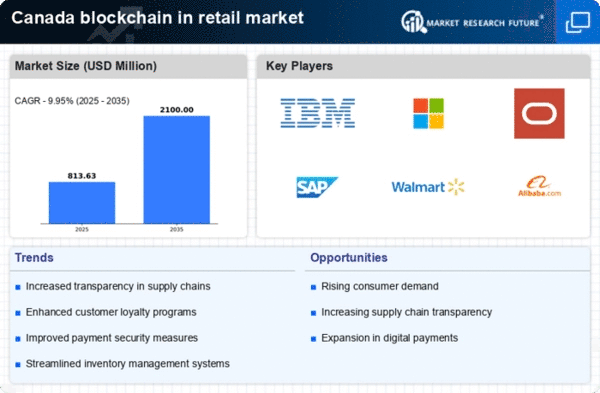Enhanced Customer Experience
The blockchain in-retail market is poised to transform customer experiences through personalized services and streamlined transactions. Retailers are beginning to utilize blockchain to create loyalty programs that reward customers for their engagement. In Canada, studies indicate that 60% of consumers are more likely to shop with brands that offer personalized experiences. By leveraging blockchain, retailers can securely store customer data and preferences, enabling tailored marketing strategies. Additionally, the use of cryptocurrencies for transactions may appeal to a growing segment of tech-savvy consumers. This shift towards enhanced customer experiences is likely to drive the adoption of blockchain technology, as retailers seek to differentiate themselves in a competitive landscape.
Growing Demand for Traceability
The blockchain in-retail market is experiencing a notable surge in demand for traceability solutions. Retailers are increasingly recognizing the importance of tracking products throughout the supply chain to ensure authenticity and quality. In Canada, approximately 70% of consumers express a preference for brands that provide transparent sourcing information. This trend is likely to drive the adoption of blockchain technology, as it offers immutable records that enhance product traceability. Furthermore, the ability to verify the origin of goods can significantly reduce instances of fraud and counterfeiting, which are prevalent in various sectors. As a result, retailers that implement blockchain solutions may gain a competitive edge by fostering consumer trust and loyalty, ultimately contributing to the growth of the blockchain in-retail market.
Regulatory Support and Compliance
Regulatory frameworks in Canada are evolving to accommodate the integration of blockchain technology within the retail sector. The government is actively exploring policies that promote innovation while ensuring consumer protection. This regulatory support is crucial for the blockchain in-retail market, as it provides a structured environment for businesses to operate. For instance, the Canadian government has introduced initiatives aimed at fostering technological advancements, which may include tax incentives for companies adopting blockchain solutions. As compliance becomes increasingly important, retailers that leverage blockchain technology to meet regulatory requirements could enhance their operational efficiency. This alignment with regulatory standards may also attract investment, further propelling the growth of the blockchain in-retail market.
Rising Interest in Sustainability
Sustainability is becoming a pivotal concern for consumers in Canada, influencing their purchasing decisions. The blockchain in-retail market is well-positioned to address this trend by providing transparent supply chain data that highlights sustainable practices. Approximately 65% of Canadian consumers are willing to pay more for products that are certified as environmentally friendly. By utilizing blockchain technology, retailers can offer verifiable proof of sustainable sourcing and production methods. This transparency not only enhances brand reputation but also aligns with the growing demand for corporate social responsibility. As sustainability becomes a key differentiator in the retail sector, the blockchain in-retail market is likely to benefit from increased adoption as retailers strive to meet consumer expectations.
Cost Reduction and Efficiency Gains
The blockchain in-retail market presents opportunities for significant cost reductions and efficiency improvements. By automating processes through smart contracts, retailers can minimize administrative overhead and reduce transaction costs. In Canada, businesses that have adopted blockchain solutions report an average cost reduction of 15% in supply chain operations. This efficiency is achieved through the elimination of intermediaries and the streamlining of processes, which can lead to faster transaction times. As retailers increasingly seek to optimize their operations, the potential for cost savings may drive further investment in blockchain technology. Consequently, the blockchain in-retail market is likely to expand as more companies recognize the financial benefits associated with its implementation.
















